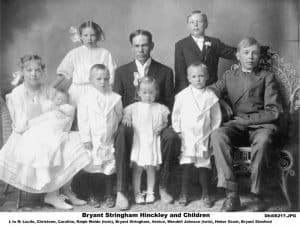This is a long lesson, and might best be presented over 2 classes. If time does not permit for this, then be please judicious in what the women in your Relief Society group need most to learn about in regard to Hinckley’s life; focus on that and omit the rest. The link to the formal lesson material is here.
In 2017, we will study the teachings of Gordon B. Hinckley (GBH) in Relief Society and Priesthood lessons. Hinckley was president of the church from 1995 to 2008. Because he was first called as Assistant to the Quorum of the Twelve Apostles in 1958, had been called to the Sunday School General board in 1937, plus being employed by the church for the majority of his professional life, we have a plethora of materials to choose from. Indeed, it is said that when asked once the hardest thing about being prophet, GBH replied that it was all of the public speaking he was required to do.
Childhood and Youth
Gordon Bitner Hinckely was born on 23 June 1910. He was first born of his mother, Ada Bitner. 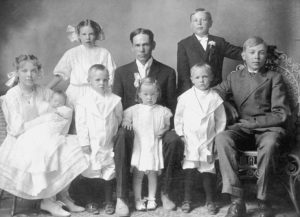 Ada was the second wife of Bryant Hinckley, Gordon’s father. Bryant’s first wife, Christine passed away on 11 July 1908, from appendicitis just two months following the birth of their 8th child, Christine Hinckley, born 11 May 1908. Christine and Bryant had 8 children, two who died very young: Grace, at age 3 and Virginia, who only lived a few hours. It was just more than a year following Christine’s death that Bryant married Ada. Bryant and Ada knew each other as they both worked at the LDS Business College. Doing the math, it’s easy to say the GBH was a “honeymoon baby” for them. Ada had four more children, but before her youngest was born in 1920, Gordon’s eldest half-brother was killed in France in 1918, a casualty of the Great War. (GBH would have been 8 years old at the time of his half-brother’s death.)
Ada was the second wife of Bryant Hinckley, Gordon’s father. Bryant’s first wife, Christine passed away on 11 July 1908, from appendicitis just two months following the birth of their 8th child, Christine Hinckley, born 11 May 1908. Christine and Bryant had 8 children, two who died very young: Grace, at age 3 and Virginia, who only lived a few hours. It was just more than a year following Christine’s death that Bryant married Ada. Bryant and Ada knew each other as they both worked at the LDS Business College. Doing the math, it’s easy to say the GBH was a “honeymoon baby” for them. Ada had four more children, but before her youngest was born in 1920, Gordon’s eldest half-brother was killed in France in 1918, a casualty of the Great War. (GBH would have been 8 years old at the time of his half-brother’s death.)
How can we support families who might have step-parents as the result of death or divorce? How can ward and branch members support non-traditional families? How can we support parents and children who have lost a child or sibling?
When President Joseph F. Smith announced the Family Home Evening program in 1915, Bryant and Ada decided to make that a part of their lives for their children. “We tried it, and it wasn’t very successful at first,” said GBH.
“But it got better, and we’ve always had family home evenings—in my father’s home and in my home, and the children have it in their homes.” (1)
Bryant and Ada also made a firm impression on GBH in the way in which they disciplined their children. The family had a summer house on a farm where they were encouraged to play and get outdoor exercise. They also had a room in their home dedicated to “good books,” for the children to read and enjoy. From the manual:
“They inspired discipline in their children by encouraging them and expecting the best of them”
This type of discipline was based in love, not corporal punishment. He said:
I don’t believe that children need to be beaten, or anything of that kind. Children can be disciplined with love. They can be counseled—if parents would take the time to sit down quietly and talk with them. Tell them the consequences of misbehaving, of not doing things in the right way. The children would be better off, and I think everyone would be happier.
“My father never touched us. He had a wisdom all his own of quietly talking with us. He turned us around when we were moving in the wrong direction, without beating us or taking a strap to us or any of that kind of business. I’ve never been a believer in the physical punishment of children. I don’t think it is necessary.” (2)
How can doing things such as FHE help put our families in better, loving communication so we can avoid yelling or striking children? How can we as church members help our friends and fellow church members to use love and speak patiently with children when the children might not be making ideal choices? How can we set this example in our own homes?
Gaining Personal Testimony
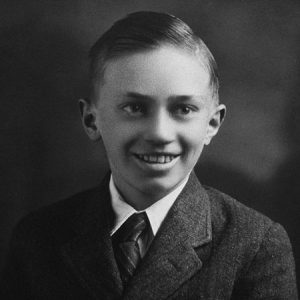 The GBH manual teaches that young Gordon attended a priesthood meeting with his father. In that meeting, as the men sang, GBH felt the spirit so strongly that his testimony of Joseph Smith was confirmed:
The GBH manual teaches that young Gordon attended a priesthood meeting with his father. In that meeting, as the men sang, GBH felt the spirit so strongly that his testimony of Joseph Smith was confirmed:
“Something happened within me as I heard those men of faith sing. There came into my boyish heart a knowledge, placed there by the Holy Spirit, that Joseph Smith was indeed a prophet of the Almighty.”
How can good music help us to develop and grow a testimony? How has music influenced you in feeling the spirit?
Young Adulthood
In 1928, GBH graduated from high school and began studying at the University of Utah. In 1929, the Great Depression hit, and had a lasting effect on GBH’s remaining years as a university student. The manual teaches us that he was employed as a “maintenance worker” which helped to pay for his tuition and overall cost of school.
How does it make you feel to know that one of the future prophets of the church once worked as a humble cleaner? How does this set an example for us in doing hard work?
Around this same time, Ada, GBH’s beloved mother, was diagnosed with cancer. She died in 1930, when Gordon was just 20. He described his personal distress at losing his mother as “deep and painful.” In such a trying time- the Great Depression and loss of his mother, he entered a season of doubt. But this was not significant enough to turn him from the church. He later said of this time in his life:
“There was for me an underlying foundation of love that came from great parents and a good family, a wonderful bishop, devoted and faithful teachers, and the scriptures to read and ponder.”
How can we support children, youth and young adults in their trials? How can we support those we visit teach and those in our wards and stakes when they have personal crises that turn into faith crises?
Shortly after his mother Ada’s death in 1932, GBH’s father, Bryant wanted to marry for the third time. This was typical of Bryant who married 4 women in his life, always within 12-24 months of a previous wife’s death. (Gordon’s grandfather had more than one living wife as he was a product of Mormon polygamous history). Gordon was against this marriage, as his heart still ached for his mother, Ada. Bryant asked Gordon, “Would you want me to grow old alone?”
Gordon took some time to think about what he wanted for his father, and to consider how his father was feeling. Bryant’s 2 youngest children, Gordon’s siblings, were just 12 and 16. Gordon ended up apologising to his father, and did not offer any more opposition to the marriage of Bryant and his third wife, May Green. May had a positive and powerful influence within the Hinckley family. The children of Bryant’s first wife, and the children of Bryant’s second wife did not always get along prior to May joining the family. May worked diligently and lovingly to bond the children of Bryant’s first and second wives to unify the family. May herself did not have any biological children, but the extended Hinckley family credit her with being the one who united the children of Christine and Ada to a place where they did not see one another as step-siblings, but as a united, loving family.
How can we help blended families feel united? How can we help our own families feel united when we might have residual jealousies or hurt feelings?
Missionary Service
In June 1932, just as he graduated from the University, GBH was approached by his bishop about serving a mission. As many young men had forgone serving a mission because of the financial pressures of the times, GBH was surprised. But his father, Bryant, and GBH’s brother Sherman, who was just 18, committed to financially supporting Gordon on his mission. Then a sweet miracle occurred:
It was at that time that we discovered a little savings account my mother had left—change saved from her grocery purchases and other shopping. With that little bit of help added, it appeared I could go on my mission.” He considered his mother’s coins to be sacred. “I guarded them with my honor,” he said.
How can living in a thrifty manner now be a blessing for us and those we love in future?
GBH struggled as he started his mission. He was struggled with allergies and was disappointed by the lack of teaching appointments. From the manual:
Feeling that he was wasting his time and his family’s money, Elder Hinckley wrote a letter to his father explaining his unhappy situation. Bryant Hinckley replied with advice that his son would follow throughout his life. “Dear Gordon,” he wrote, “I have your recent letter. I have only one suggestion.” And then those six words that added weight to the five he had written earlier: “Forget yourself and go to work.” This counsel echoed a scripture passage Elder Hinckley had read with his companion earlier that day: “Whosoever will save his life shall lose it; but whosoever shall lose his life for my sake and the gospel’s, the same shall save it” (Mark 8:35).
With his father’s letter in his hand, the young Elder Hinckley got on his knees and made a pledge that he would give himself to the Lord…[Later], Gordon [added] that he also received help from his mother. He felt her comforting presence, especially during the dark and discouraging times.
When we are feeling disheartened, how can something as simple as “forget yourself and go to work,” be helpful? As mothers, we might often have *years* wherein we have little time to meet our own needs. What can we do to look after ourselves and each other to ensure we aren’t suffering burnout? How can feeling the comfort of our earthly mother or even our Heavenly Mother help us in trying times?
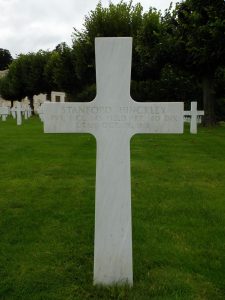 Before returning to the US, GBH spent a little extra time in Europe following his mission. Partnered with two other missionaries, he went to the American Military Cemetery in Suresnes, France. One of the other missionaries travelling with GBH, G. Homer Durham recorded the following experience:
Before returning to the US, GBH spent a little extra time in Europe following his mission. Partnered with two other missionaries, he went to the American Military Cemetery in Suresnes, France. One of the other missionaries travelling with GBH, G. Homer Durham recorded the following experience:
“Stretching to the gates were 1541 graves marked with white marble crosses…. Then GBH led us to row 11, #5, and said, ‘Brethren, there’s my oldest brother.’ We read: ‘Stanford Hinckley, Utah, October 19, 1918.’ After a few moments’ silence, Brother GBH spoke again – ‘Brethren, this grave has probably never been dedicated.’ It has been now. We stood in silence while our companion, in power, prayed that this might be a hallowed spot until the day looked forward to.” (3)
Why is it important for us to dedicate the graves of church members? How might this bring us closure of a loved one who has passed?
A month after his mission, GBH attended a meeting with the members of the first presidency of the church. He did so at the request of Elder Joseph F. Merrill who had asked him to make a report on needs in the British and European Missions. The meeting had a profound effect on the members of the first presidency, and resulted in them extended a “job as executive secretary of the newly formed Church Radio, Publicity, and Mission Literature Committee. This committee, made up of six members of the Quorum of the Twelve, would work to address the needs that Gordon had outlined in his meeting with the First Presidency.”
This committee had 6 members of the Quorum of the 12 in addition to 5 other prominent church members, including Gordon’s uncle. Of working with this group of men, GBH said:
“I got along wonderfully well with those great men, who were very kind to me. But I learned that they were human. They had weaknesses and problems, but that didn’t bother me. In fact, it enhanced my estimation of them because I saw rising above their mortality an element of the divine, or at the very least an element of consecration to a tremendous cause that came first in their lives. I saw the inspiration that was at work in their lives. I had no doubt concerning their prophetic callings or of the fact that the Lord spoke and acted through them. I saw their human side, their foibles—and they all had a few. But I also saw the great overriding strength of their faith and love for the Lord, and their absolute loyalty to the work and to the trust that was placed in them.”
How can our understanding of church leaders and family members as “humans” bring us patience in working with them? What does this teach us about our own struggles and challenges?
Marriage, family, and beginning a career
During this time, GBH’s love interest, Marjorie Pay had un-enrolled from the University of Utah in order to support her parents. This was as a result of her father having lost his job in the Great Depression. Though she never obtained a formal education, Marjorie continued in her personal studies by becoming a great reader of books. GBH and Marjorie married in 1937, the same year that Gordon was called to serve on the General Sunday School Board. (4)
President Hinckley said in an interview once:
The basis of a good marriage is mutual respect—respect for one another, a concern for the comfort and well-being of one another. That is the key. If a husband would think less of himself and more of his wife, we’d have happier homes throughout the Church and throughout the world… (5)
Marjorie Hinckley has also said: “He never tells me what to do. He just lets me go. 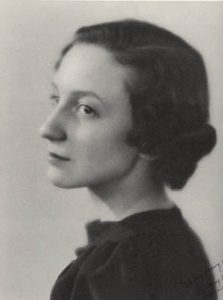 He has made me feel like a real person. He has encouraged me to do whatever makes me happy. He doesn’t try to rule or dominate me.” (6)
He has made me feel like a real person. He has encouraged me to do whatever makes me happy. He doesn’t try to rule or dominate me.” (6)
How can we improve “mutual respect” in our marriages? How can we work to not dominate one another in marriage and family relationship? Why is the concept of domination something that in unhealthy in marriages and with children?
In 1943, May Green Hinckley, who had worked to help Gordon and his half-siblings unite, passed away. When Bryant announced in 1945 that he wanted to marry Lois Anderson, no opposition was offered from any of Bryant’s children, including Gordon. That same year, Gordon and Marjorie welcomed their third child, a daughter named Virginia, who was named for Gordon’s (half) sister who had passed away in infancy.
How can we unite our families after there has been hurt and conflict? How does doing this increase the spirit in our lives?
At the same time, the war ended. GBH had taken different employment during the war as means to support the war effort. With the war at an end, the church invited him back to full time church employment. He began working for the church again, eventually moving to the Missionary department. In 1952, President David O. McKay invited GBH to ponder and consider the temple endowment. The Switzerland temple was under construction, and would become the first temple to not have English as its prominent language. McKay wanted to simplify the temple so that a minimum number of temple workers could be used, and that the ceremony could be completed in any language. From the manual:
After pondering, praying, and seeking revelation, Gordon recommended that the presentation of the endowment be put on film, with the words of that sacred instruction dubbed in several languages. President McKay and others approved his recommendation and assigned him to produce the film. Gordon worked with a team of talented and faithful professionals who completed the project in September 1955. He then personally carried the films to the Bern Switzerland Temple and oversaw the technical preparations for the initial endowment sessions.
Work as a New General Authority
In 1958, GBH was called as a General Authority as an assistant to the Quorum of the Twelve, then in 1961, he was called as a member of the Quorum of the Twelve. By this time, it was clear that GBH felt very strongly about being sealed in the temple as husband and wife and as a family. Not just for him and his family, but everyone within the church and world. This is a quote from his conference talk in April 1974:
I remember hearing in New Zealand the testimony of a man from the far side of Australia who, having been previously sealed by civil authority and then joined the Church with his wife and children, had traveled all the way across that wide continent, then across the Tasman Sea to Auckland, and down to the temple in the beautiful valley of the Waikata. As I remember his words, he said, “We could not afford to come. Our worldly possessions consisted of an old car, our furniture, and our dishes. I said to my family, ‘We cannot afford to go.’ Then I looked into the faces of my beautiful wife and our beautiful children, and I said, ‘We cannot afford not to go. If the Lord will give me strength, I can work and earn enough for another car and furniture and dishes, but if I should lose these my loved ones, I would be poor indeed in both life and in eternity.’”
How do you feel about the concept of eternal marriage and eternal families? What are ways we can remember that eternal families are not limited to those on earth, but that all of us are sealed as a part of our Heavenly Parents’ family?
Called to the First Presidency
In 1981, GBH was called to serve as a counselor in the First Presidency. At the time, there were 3 counsellors, rather than the standard two; President Kimball and his counselors were not well physically and needed extra support in the Presidency. At this time, GBH carried the bulk of the duties of the first presidency as needed. From the manual:
President Tanner passed away on November 27, 1982, and the health of Presidents Kimball and Romney declined to the point that in the April 1983 general conference, President Hinckley, who by then had been called as Second Counselor in the First Presidency, sat next to empty chairs on the stand. In a deeply personal way, he felt what he had once called “the loneliness of leadership.”
What do you think GBH means by “the loneliness of leadership”? How is it also lonely for the women whose husbands are away or can’t sit with them as the men are doing church service? When we are alone, how can the spirit sustain us to do the work we are called to do?
After the death of Kimball, GBH was called as First Counsellor in the First presidency under Ezra Taft Benson. As Benson also fell into ill health, GBH was an ongoing beam of strength under the guidance and direction of Benson in doing the work of the church. Benson passed away in 1994, making way for Howard W, Hunter to serve as president. Hunter kept GBH as First Counsellor, and Thomas S. Monson as Second Counsellor. Hunter’s short time as president of the church resulted in GBH being faced with the leadership of the church. This was not an easy thing for him to consider. Marjory Pay Hinckley said of this time:
“President Hunter had gone, and we were left to carry on. I felt so sad, so alone. Gordon did, too. He was numb. And he felt very, very lonely. There was no one left who could understand what he was going through.”
I like how Marjorie’s said, “we were left to carry on.” It shows that she was united with her husband. Do you feel that way about the calling your spouse’s calling? Should you? Why or why not?
As GBH pondered his next steps, he went to the temple to seek guidance and inspiration. This is what he later wrote:
“I got on my knees and pleaded with the Lord. I spoke with Him at length in prayer. … I am confident that by the power of the Spirit, I heard the word of the Lord, not vocally, but as a warmth that was felt within my heart concerning the questions I had raised in prayer.”
After this experience he again recorded his thoughts: “I feel better, and I have a much firmer assurance in my heart that the Lord is working His will with reference to His cause and kingdom, that I will be sustained as President of the Church and prophet, seer, and revelator, and so serve for such time as the Lord wills. With the confirmation of the Spirit in my heart, I am now ready to go forward to do the very best work I know how to do. It is difficult for me to believe that the Lord is placing me in this most high and sacred responsibility. … I hope that the Lord has trained me to do what He expects of me. I will give Him total loyalty, and I will certainly seek His direction.”
Have you ever felt unequal to a calling or a task that has been placed in your care? How did you manage this challenge? How can you feel loyal to the Lord in working through the challenges you are faced with?
A New Prophet
A year after GBH became the president of the church in 1996, church membership outside of the US exceeded church membership in the US. (7) Possibly as an acknowledgement of this, he pioneered the construction of 77 temples in his time as prophet, with 14 more planned at the time of his passing. This is a witness to his desire for the members of the worldwide church to be able to participate in temple ordinances and be sealed as families.(8) GBH also instigated the Proclamation of the Family which still has an effect on church members today. (Important to note is that this document is NOT canonized as a part of LDS theology. Discussion of it might be hurtful to some of the women you are teaching, so please be mindful of the needs of the women in your class.)
Remember that GBH’s parents were teachers at the LDS business college when they met. The concept of teaching and education were always a part of his home growing up, as well as in the home he shared with Marjorie. In April 2001, GBH introduced the “Perpetual Education Fund” to help impoverished saints. From the manual:
President Hinckley explained that those benefiting from the program would be given loans, taken from funds donated by Church members, for school or vocational training. After completing their education or training, they would be expected to repay their loans so the funds could be used to help others. President Hinckley also explained that the Perpetual Education Fund would be “based on similar principles to those underlying the Perpetual Emigrat[ing] Fund,” which the Church had established in the 1800s to help needy Saints emigrate to Zion.
Have you experiences the new PEF? How has this had an effect on you?
In April 2004, Marjorie was unable to attend General Conference. 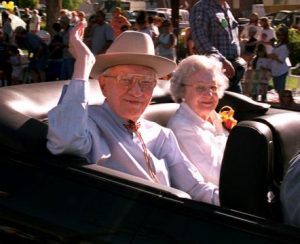 She passed away shortly thereafter. Both she and her husband were known for their ability to make jokes and for their sense of humour. “If we can’t laugh at life, we are in big trouble,” Marjorie was quoted as saying. Her ability to have fun and put others at ease was one of her many gifts. One of her favourite quips was, “How did a nice girl like me end up in a mess like this?” (9) After her passing, many people made contributions in Marjorie Hinckley’s name to the Perpetual Education Fund.
She passed away shortly thereafter. Both she and her husband were known for their ability to make jokes and for their sense of humour. “If we can’t laugh at life, we are in big trouble,” Marjorie was quoted as saying. Her ability to have fun and put others at ease was one of her many gifts. One of her favourite quips was, “How did a nice girl like me end up in a mess like this?” (9) After her passing, many people made contributions in Marjorie Hinckley’s name to the Perpetual Education Fund.
Media Presence and the Church
From the manual:
Toward the beginning of President Hinckley’s ministry, Elder Neal A. Maxwell of the Quorum of the Twelve observed: “President Hinckley is helping to lead the Church out of obscurity. The Church can’t move forward as it needs to if we are hidden under a bushel. Someone has to step out, and President Hinckley is willing to do so. He is a man of history and modernity at the same time, and he has marvelous gifts of expression that enable him to present our message in a way that appeals to people everywhere.”
GBH’s background and work with journalists and international relations helped him to bring the church into the modern age. He travelled extensively in his church callings, meeting and speaking to as many people as possible. Because he was aware of the frail nature of those in the first presidency, he also “championed the use of technology to instruct leaders around the world. Using satellite technology, he presided over worldwide leadership training broadcasts, the first one held in January 2003.”
How did having a prophet with such extensive media experience help the church to become better recognised in the 21st century? It almost seems like GBH’s legacy was in preparation for the Internet age. Can you imagine what it would be like if the church did not have the internet or broadcast systems? How has the internet and church broadcasts been a blessing to you and your family?
In 1995, GBH approved a plan to create a lesson manual series called Teachings of Presidents of the Church. This series began shortly thereafter and has been the handbook for Relief Society and Priesthood meetings for the past 2 decades. With his passing in 2008, Gordon B. Hinckley is the last prophet to be included in this formal series.
From the manual:
The Tabernacle Choir sang a new hymn as part of the meeting, titled “What Is This Thing That Men Call Death?” The words of the hymn were written by President Hinckley—his final testimony of Jesus Christ to his friends who had looked to him as a prophet:
What is this thing that men call death,
This quiet passing in the night?
’Tis not the end, but genesis
Of better worlds and greater light.
O God, touch Thou my aching heart,
And calm my troubled, haunting fears.
Let hope and faith, transcendent, pure,
Give strength and peace beyond my tears.
There is no death, but only change
With recompense for victory won;
The gift of Him who loved all men,
The Son of God, the Holy One.
Does anyone have a favourite memory of President Hinckley that they would like to share?
(1) At Home With The Hinckleys
(2) Ibid. See also Personal Worthiness To Exercise The Priesthood
(3) G. Homer Durham Journal, 2 July 1935, as quoted in Dew, Sheri L. Go Forward with Faith. Deseret Book Co., Salt Lake City, Utah, 1996. Print.
(4) Ibid, 304, 395–401
(5) At Home With The Hinckleys
(6) Ibid
(7) Fidel, Steve (February 26, 1996), “Members living abroad outnumber LDS in U.S.”, Deseret News
(8) 2008 Deseret Morning News Church Almanac(Salt Lake City, Utah: Deseret Morning News, 2007) pp. 507–08
(9) Marjorie Pay Hinckley Dies


